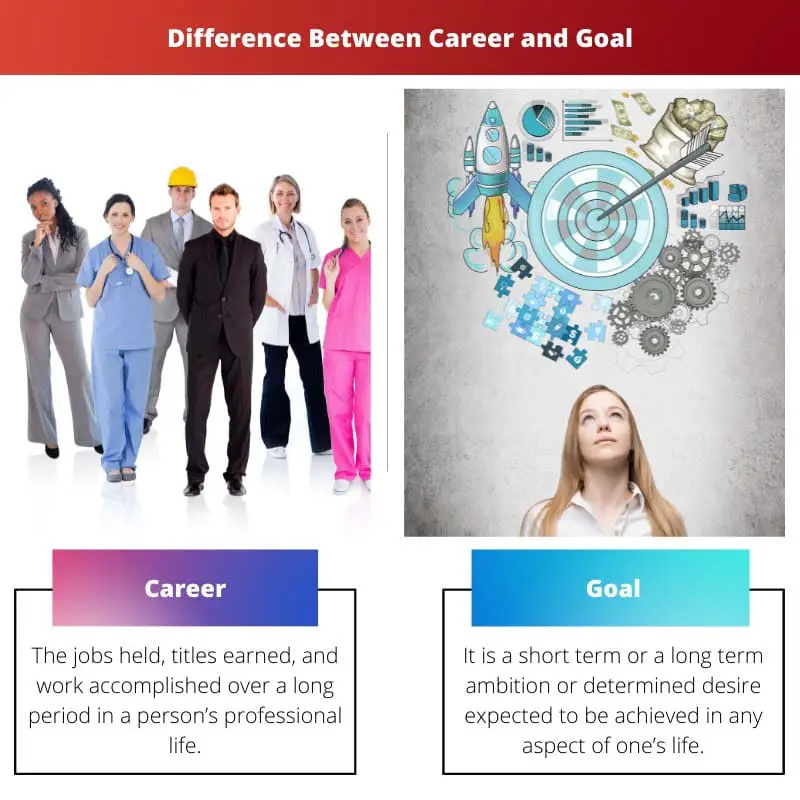Career is the trajectory of one’s professional journey, marked by progression, achievements, and expertise acquisition. Goals, on the other hand, are specific targets individuals aim to achieve within their careers, guiding their actions and decisions. Balancing both entails aligning personal aspirations with professional advancement, fostering fulfillment and growth.
Key Takeaways
- A career is a chosen profession that a person pursues for a long-term period.
- A goal is a specific outcome or achievement that a person hopes to reach in a short or long-term period.
- A career is a broader concept, while a goal is more specific.
Career vs Goal
A career refers to the profession or occupation that a person chooses to pursue in their life, is a long-term and may involve several transitions. A goal refers to a specific objective that a person sets out to achieve, could be short-term or long-term, and may be related to other aspects of life.

Comparison Table
| Feature | Career | Goal |
|---|---|---|
| Definition | A long-term journey in a specific field of work, involving development, growth, and advancement | A specific, measurable outcome that you strive to achieve within a certain timeframe |
| Scope | Broader and encompasses many smaller goals throughout your professional life | Narrower and focuses on a specific achievement related to your career path or personal development |
| Timeframe | Long-term (years or even decades) | Shorter-term (can be days, weeks, months, or years) |
| Flexibility | Can evolve and change as you gain experience and your values and interests shift | Specific and targeted, but may be adjusted based on progress and circumstances |
| Measurement | Measured by progress, advancement, and satisfaction in your chosen field | Measured by completion and achievement of the specific outcome |
| Examples | Becoming a doctor, engineer, teacher, etc. | Getting a promotion, completing a professional development course, mastering a specific skill, etc. |
What is Career?
Definition of Career
A career can be defined as the pursuit of continuous personal and professional development through employment, education, and other life experiences. It encompasses the roles, responsibilities, and achievements that an individual accumulates throughout their working life. A career is not limited to a single job or industry but rather reflects a lifelong journey of learning, growth, and adaptation.
Purpose of a Career
The purpose of a career extends beyond mere financial gain or job stability. It serves as a vehicle for personal fulfillment, self-expression, and contribution to society. A well-nurtured career provides individuals with a sense of purpose, direction, and satisfaction as they pursue their passions, leverage their strengths, and overcome challenges. Moreover, a fulfilling career contributes to overall well-being and a sense of accomplishment, enriching both personal and professional lives.
Components of a Career
A career comprises various components, each playing a crucial role in shaping an individual’s professional trajectory:
- Education and Skill Development: Education forms the foundation of a career, equipping individuals with the knowledge, skills, and competencies necessary for success in their chosen field. Lifelong learning and skill development are integral to staying relevant and adaptable in today’s dynamic job market.
- Employment and Work Experience: Employment represents the practical application of one’s skills and expertise within a specific job or role. Work experience allows individuals to gain valuable insights, build networks, and refine their abilities while contributing to organizational goals.
- Advancement and Growth Opportunities: Advancement signifies progression within a career, whether through promotions, increased responsibilities, or transitions to higher-level roles. Growth opportunities enable individuals to expand their capabilities, pursue new challenges, and achieve their professional aspirations.
- Work-Life Balance and Well-Being: Maintaining a healthy work-life balance is essential for sustaining long-term career satisfaction and overall well-being. Balancing professional responsibilities with personal interests, relationships, and leisure activities fosters resilience, creativity, and fulfillment.

What is Goal?
Definition of Goal
A goal is a desired outcome or result that individuals strive to accomplish within a defined timeframe. It represents a clear and tangible objective that guides decision-making, planning, and execution of actions. Goals can range from short-term tasks to long-term aspirations, encompassing various areas of life such as career, education, health, relationships, and personal development.
Types of Goals
Goals can be categorized based on their scope, timeframe, and purpose:
- Short-Term Goals: Short-term goals are achievable within a relatively brief timeframe, ranging from days to months. They focus on immediate tasks and objectives, helping individuals make progress and maintain momentum towards larger aspirations.
- Long-Term Goals: Long-term goals extend over an extended period, spanning months, years, or even decades. They represent significant milestones or achievements that individuals aspire to accomplish, requiring sustained effort, planning, and perseverance.
- Personal Goals: Personal goals pertain to individual aspirations, desires, and priorities outside of professional or academic pursuits. They may include objectives related to health and wellness, relationships, hobbies, and personal growth.
- Professional Goals: Professional goals are related to career advancement, skill development, and achievement in the workplace. They encompass objectives such as securing a promotion, acquiring new certifications, or launching a business venture.
- Educational Goals: Educational goals focus on acquiring knowledge, skills, and qualifications to enhance one’s academic or professional credentials. They may involve completing a degree program, attending workshops, or pursuing continuous learning opportunities.
Importance of Goals
Goals play a fundamental role in personal development, motivation, and achievement for several reasons:
- Clarity and Focus: Setting clear goals provides individuals with a sense of direction and purpose, helping them prioritize tasks and allocate resources effectively.
- Motivation and Persistence: Goals serve as powerful motivators, inspiring individuals to take action, overcome obstacles, and persist in the face of challenges.
- Measurement and Accountability: Goals are measurable and quantifiable, allowing individuals to track progress, evaluate performance, and hold themselves accountable for results.
- Achievement and Satisfaction: Accomplishing goals brings a sense of fulfillment, accomplishment, and satisfaction, boosting self-esteem and confidence.
- Adaptability and Growth: Goals can be adjusted and refined based on changing circumstances, fostering adaptability, resilience, and continuous improvement.

Main Differences Between Career and Goal
- Scope and Duration:
- Career encompasses the entirety of one’s professional journey over a lifetime, including education, employment, and advancement.
- Goals are specific targets or objectives individuals aim to achieve within their careers or other areas of life and may vary in scope and duration.
- Nature and Definition:
- Career refers to the ongoing process of personal and professional development, involving multiple roles, experiences, and achievements.
- Goals are discrete, measurable objectives that individuals set to guide their actions and progress within their careers or other domains.
- Focus and Alignment:
- Career focuses on the broader trajectory of professional growth, encompassing long-term aspirations, values, and overall fulfillment.
- Goals are more narrowly defined and serve as stepping stones toward realizing specific aspects of one’s career vision, ensuring alignment with broader aspirations.


This article does an excellent job of elucidating the differences between career and goal.
Precisely, the article is very thorough and enlightening.
I couldn’t agree more. The elucidation is quite exceptional.
The explanation of career and goal is comprehensive and meticulously presented.
Absolutely, the meticulousness of the analysis is praiseworthy.
I think the detailed nature of the article is commendable.
I appreciate the focus on the comparison table to differentiate between a career and a goal.
I find the table to be very useful and visually appealing.
The table really does an excellent job at summarizing the key differences.
The contrasting narratives on career and goal are intellectually elevating.
Undoubtedly, the article is very intellectually stimulating.
I believe more emphasis should have been placed on the impact of achieving these goals on one’s career.
I also believe that the article could have delved deeper into this aspect.
The narrative about career and goal is presented in a very engaging and clever manner.
Agreed, the article has an intriguing way of presenting the differences.
The analysis of the difference between career and goal is insightful and thorough.
I find the way the concepts are explained to be very enriching and thought-provoking.
Indeed, the comparison is very detailed and helpful.
The detailed definitions of career and goals are insightful and intellectually stimulating.
Absolutely, the explanations are very enriching.
I couldn’t agree more, the content is intellectually invigorating.
The article could benefit from a more comical approach to liven up the content.
I disagree. A serious tone seems more suitable for this article.